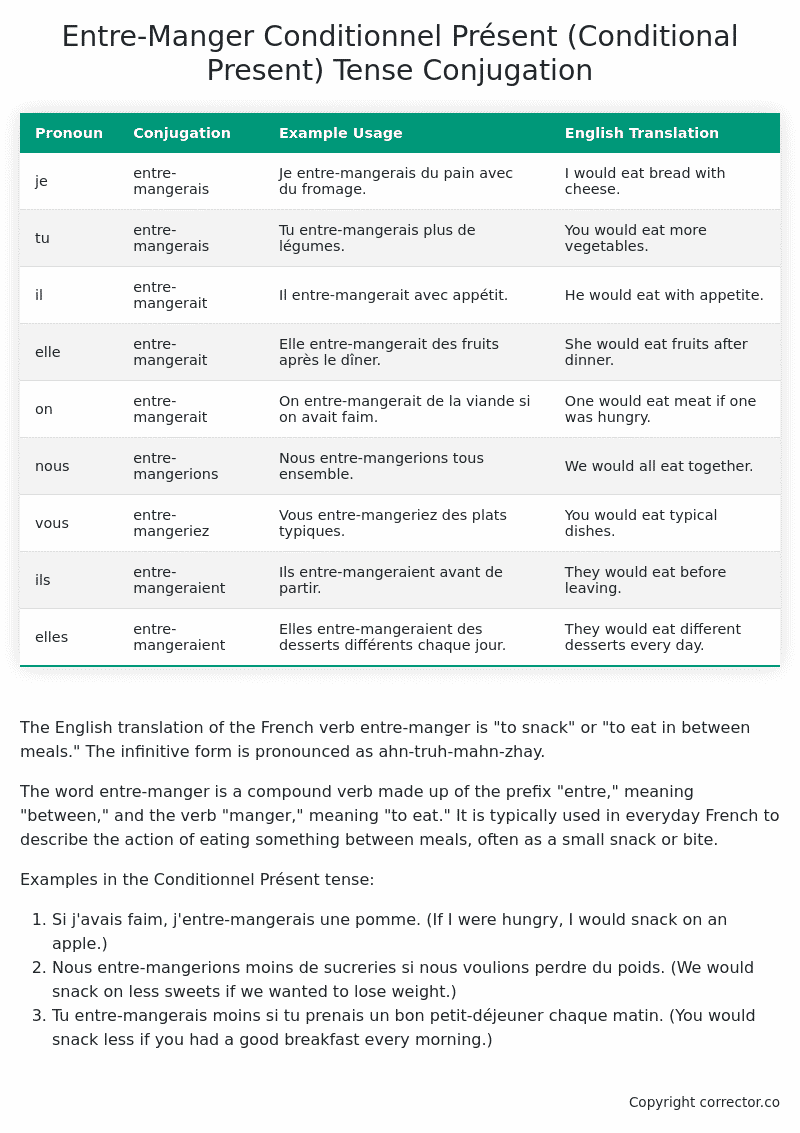Conditionnel Présent (Conditional Present) Tense Conjugation of the French Verb entre-manger
Introduction to the verb entre-manger
The English translation of the French verb entre-manger is “to snack” or “to eat in between meals.” The infinitive form is pronounced as ahn-truh-mahn-zhay.
The word entre-manger is a compound verb made up of the prefix “entre,” meaning “between,” and the verb “manger,” meaning “to eat.” It is typically used in everyday French to describe the action of eating something between meals, often as a small snack or bite.
Examples in the Conditionnel Présent tense:
- Si j’avais faim, j’entre-mangerais une pomme. (If I were hungry, I would snack on an apple.)
- Nous entre-mangerions moins de sucreries si nous voulions perdre du poids. (We would snack on less sweets if we wanted to lose weight.)
- Tu entre-mangerais moins si tu prenais un bon petit-déjeuner chaque matin. (You would snack less if you had a good breakfast every morning.)
Table of the Conditionnel Présent (Conditional Present) Tense Conjugation of entre-manger
| Pronoun | Conjugation | Example Usage | English Translation |
|---|---|---|---|
| je | entre-mangerais | Je entre-mangerais du pain avec du fromage. | I would eat bread with cheese. |
| tu | entre-mangerais | Tu entre-mangerais plus de légumes. | You would eat more vegetables. |
| il | entre-mangerait | Il entre-mangerait avec appétit. | He would eat with appetite. |
| elle | entre-mangerait | Elle entre-mangerait des fruits après le dîner. | She would eat fruits after dinner. |
| on | entre-mangerait | On entre-mangerait de la viande si on avait faim. | One would eat meat if one was hungry. |
| nous | entre-mangerions | Nous entre-mangerions tous ensemble. | We would all eat together. |
| vous | entre-mangeriez | Vous entre-mangeriez des plats typiques. | You would eat typical dishes. |
| ils | entre-mangeraient | Ils entre-mangeraient avant de partir. | They would eat before leaving. |
| elles | entre-mangeraient | Elles entre-mangeraient des desserts différents chaque jour. | They would eat different desserts every day. |
Other Conjugations for Entre-Manger.
Le Present (Present Tense) Conjugation of the French Verb entre-manger
Imparfait (Imperfect) Tense Conjugation of the French Verb entre-manger
Passé Simple (Simple Past) Tense Conjugation of the French Verb entre-manger
Passé Composé (Present Perfect) Tense Conjugation of the French Verb entre-manger
Futur Simple (Simple Future) Tense Conjugation of the French Verb entre-manger
Futur Proche (Near Future) Tense Conjugation of the French Verb entre-manger
Plus-que-parfait (Pluperfect) Tense Conjugation of the French Verb entre-manger
Passé Antérieur (Past Anterior) Tense Conjugation of the French Verb entre-manger
Futur Antérieur (Future Anterior) Tense Conjugation of the French Verb entre-manger
Subjonctif Présent (Subjunctive Present) Tense Conjugation of the French Verb entre-manger
Subjonctif Passé (Subjunctive Past) Tense Conjugation of the French Verb entre-manger
Subjonctif Imparfait (Subjunctive Imperfect) Tense Conjugation of the French Verb entre-manger
Conditionnel Présent (Conditional Present) Tense Conjugation of the French Verb entre-manger (this article)
Conditionnel Passé (Conditional Past) Tense Conjugation of the French Verb entre-manger
L’impératif Présent (Imperative Present) Tense Conjugation of the French Verb entre-manger
L’infinitif Présent (Infinitive Present) Tense Conjugation of the French Verb entre-manger
Struggling with French verbs or the language in general? Why not use our free French Grammar Checker – no registration required!
Get a FREE Download Study Sheet of this Conjugation 🔥
Simply right click the image below, click “save image” and get your free reference for the entre-manger Conditionnel Présent tense conjugation!

Entre-Manger – About the French Conditionnel Présent (Conditional Present) Tense
Formation
Common Everyday Usage Patterns
Expressing Polite Requests
Expressing Hypothetical Situations
Expressing Doubt or Uncertainty
Interactions with Other Tenses
Present Tense
Past Tense
Future Tense
Conditional Perfect
Summary
Want More?
I hope you enjoyed this article on the verb entre-manger. Still in a learning mood? Check out another TOTALLY random French verb conjugation!


